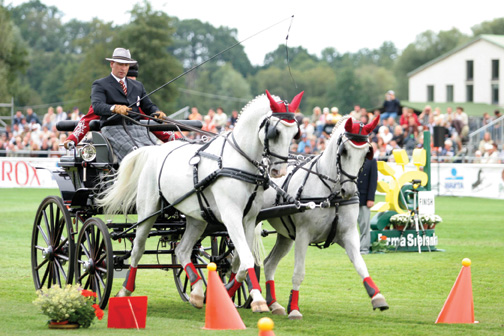The driving skills of the Germans couldn’t be matched.
Germany was in complete control at the FEI World Pair Driving Championship, held Aug. 29-Sept. 2 at Fara Sielanka in Warka, Poland.
Teammates Klaus Tebbe and Rudolf Huber placed first and second in the marathon course, respectively, helping them secure the team gold with teammate Sebastian Warneck (274.27) over Hungary (278.49) and the Netherlands (280.14).
 Hungary’s Vilmos Lazar finished the championships as the individual winner for the third time in his career, with Warneck taking the silver and Lazar’s compatriot Karoly Hodi receiving the individual bronze.
Hungary’s Vilmos Lazar finished the championships as the individual winner for the third time in his career, with Warneck taking the silver and Lazar’s compatriot Karoly Hodi receiving the individual bronze.
United States team members Elizabeth Singer, Larry Poulin and Keady Cadwell placed seventh overall (322.39).
In the dressage phase, the Netherlands took the early lead with a total score of 87.04, ahead of Hungary’s 94.21 and Germany’s 94.84.
Singer faced complications when one of her dressage horses was pulled out of the competition by the president of the ground jury; her dressage score resulted in a 65.66.
“While it was my horse’s [Avalon Avant Garde] seventh World Championship, it was only his second dressage test. Ever,” Singer said. “I think I would have pulled off a really good performance otherwise.”
Larry Poulin scored a 52.99 along with Keady Cadwell’s 51.71, giving the team a total of 104.70 and the eighth position after the dressage section of the competition.
ADVERTISEMENT
Competitors were unable to beat Warneck’s top score of 39.42 in the dressage. The Netherlands’ Mieke Van Tergouw took second (41.73), and Austria’s Georg Moser placed third (44.29).
Dr. Wolfgang Asendorf designed a demanding and tight marathon course; the two-foot deep sand on the 9.1-kilometer course provided much difficulty. Horses such as Singer’s smaller Morgans couldn’t keep up with the larger warmbloods, and the deep footing posed the biggest challenge.
For Germany’s Tebbe, however, the early start to the marathon course worked to his advantage as he posted times to beat.
“The obstacles were very heavy, and I tried to keep my pace up throughout the whole marathon,” said Tebbe, a farrier from Neuenkirchen.
Huber, who won the marathon competition at the 2005 World Pair Championships in Wals-Siezenheim (Austria), aimed for the win in the marathon but settled for second.
“I had adjusted my routes in the obstacles because I knew that being one of the last starters, I could encounter bad footing in the obstacles,” said Huber, who was a member of the German team at the World Pairs Championship in 2001 and 2005. “I decided to take fluent routes, and this proved to be a good decision because the sand got deeper after every competitor.”
Cadwell had even more of a challenge as she had to use her dressage team for the marathon due to her horse suffering from a last-minute abscess.
“My horses are young; they need to mature,” said Cadwell. “But the summer was a good experience, and all the summer shows prepared them for the electric experience with the large crowds.”
The cones provided much excitement for the crowd on the final day of competition. Filled with many difficult places such as tight turns demanding full attention from the horses, the course also required long runs throughout the ring.
ADVERTISEMENT
The cones course provided Singer the opportunity to move up in the standings after disappointing scores from the other sections. After entering the cones phase in 49th place, she ended up 23rd overall.
“I went very fast and made the other competitors realize they had to go fast as well,” she said. “The horses came right back to me at the difficult cones, and as we were getting near the end my back tire nicked the last ball. I had 3 points for the ball but made the time and ended up being fifth in the cones.”
For Lazar, his score of 3.72 in the cones round was all he needed to secure the gold medal. “After my dressage test I thought I had lost my chances of winning a medal,” he said. “In my opinion, the judges gave me fewer points than I deserved.”
Lazar’s fifth place in the marathon cemented his place after his opponents finished the section with mistakes, and Lazar moved into the first position. Lazar will continue driving a pair but also has plans to start to put a team together again.
While the U.S. team members and supporters were hoping for a better finish—Poulin was 33rd overall and Cadwell placed 35th—they couldn’t have been happier with each other and the event itself. The complications faced by the U.S. drivers only proved their team support.
Poulin stepped up for Cadwell after her horse suffered the abscess and loaned her one of his horses. The team also posted two scores in each section.
The top-notch facilities, such as the dressage and cones arena, resulted in one of the best World Championships for competitors. “It was a very well run, good all-around event,” noted Singer.
Organizer Jan Waga was satisfied with championships as well and is planning more high-level equestrian events at Farma Sielanka. He hopes to encourage young people to enter the sport, and his goal is to promote carriage driving in Poland.
Beth Johnson









